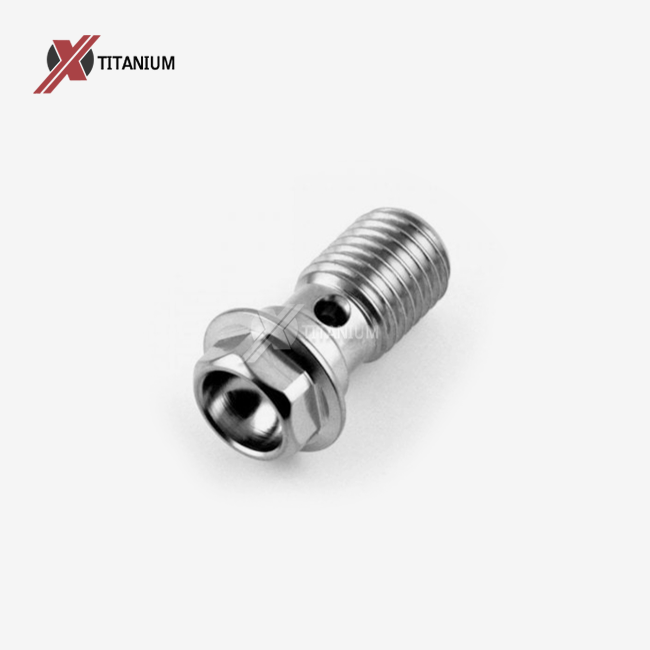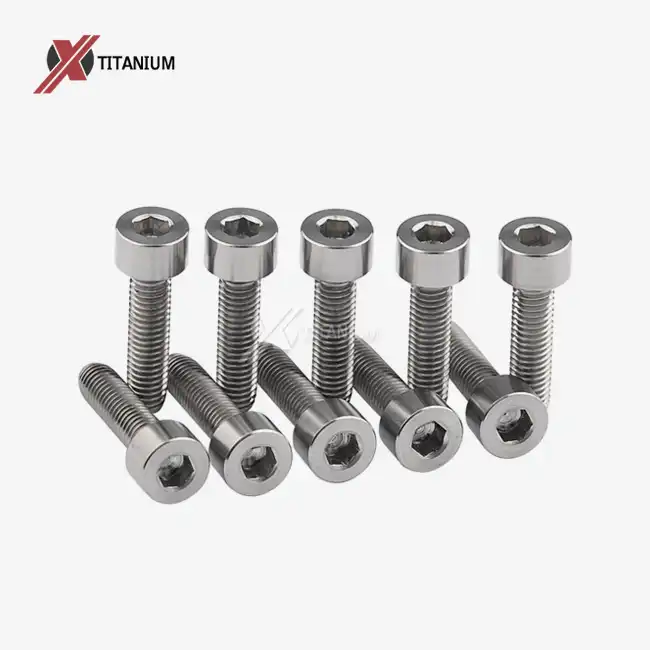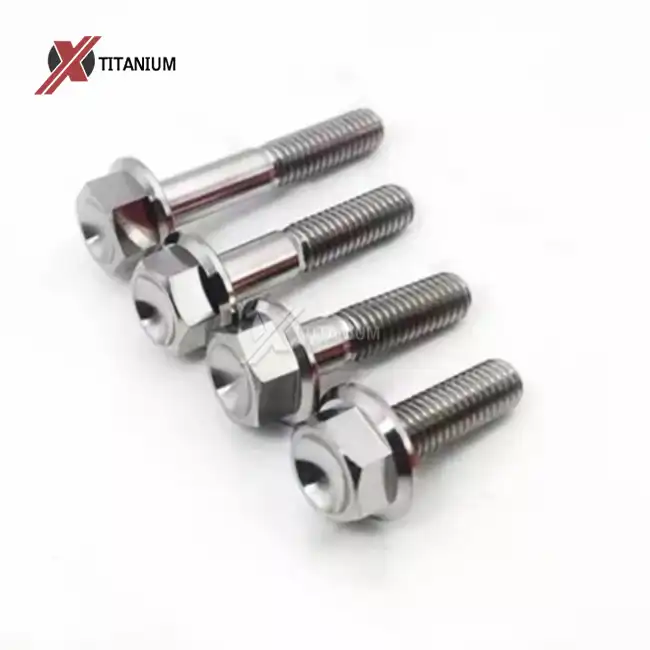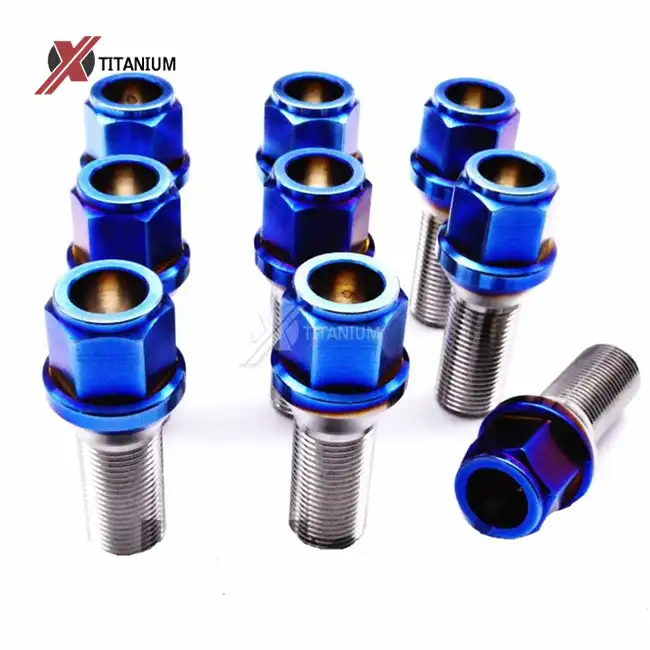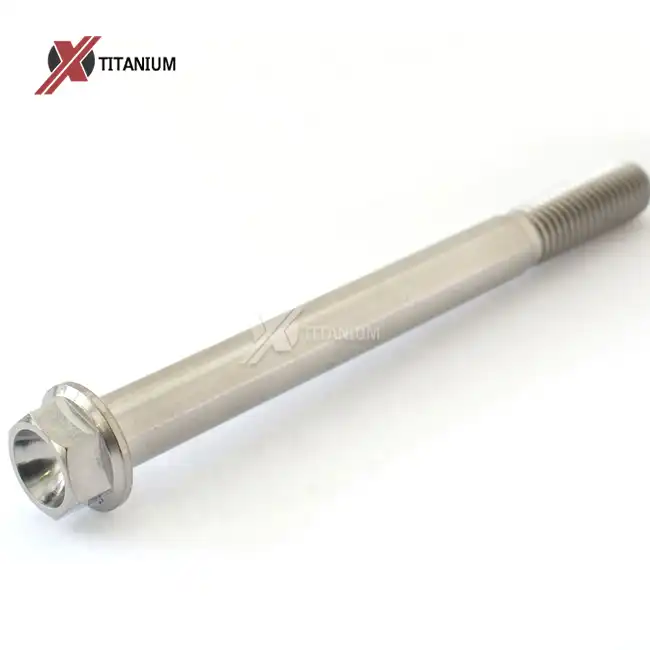Understanding the Advantages of GR5 Titanium Banjo Bolts
Superior Material Properties
Gr5 Titanium Banjo Bolts, composed of the Ti-6Al-4V alloy, boast exceptional material properties that set them apart from conventional steel bolts. This aerospace-grade titanium alloy demonstrates an impressive tensile strength of over 950 MPa, surpassing that of many steel variants. The high strength-to-weight ratio of titanium allows for the creation of bolts that are approximately 40% lighter than their steel counterparts, without compromising on structural integrity.
Moreover, the inherent corrosion resistance of titanium makes these banjo bolts impervious to rust and chemical degradation. This characteristic is particularly beneficial in automotive applications where exposure to road salt, moisture, and other corrosive elements is common. The durability of Gr5 Titanium Banjo Bolts translates to extended service life and reduced maintenance requirements, making them a cost-effective solution in the long run.
Enhanced Brake System Performance
The implementation of Gr5 Titanium Banjo Bolts in brake systems yields tangible improvements in overall performance. The reduced weight of titanium bolts contributes to decreased unsprung mass, which in turn enhances suspension responsiveness and handling. This weight reduction, although seemingly minimal, can have a cumulative effect when applied across multiple components, leading to improved acceleration and fuel efficiency.
Furthermore, the superior thermal properties of titanium play a crucial role in brake system efficiency. Titanium's lower thermal conductivity compared to steel helps in maintaining optimal brake fluid temperatures, reducing the risk of brake fade during high-performance driving or racing conditions. The material's ability to withstand high temperatures without losing its structural integrity ensures consistent brake performance even under extreme stress.
Aesthetic and Customization Options
Beyond their functional benefits, Gr5 Titanium Banjo Bolts offer aesthetic advantages that appeal to enthusiasts and custom builders. The natural titanium finish provides a distinctive, high-tech appearance that complements modern vehicle designs. Additionally, titanium's unique ability to be anodized allows for a wide range of color options, including gold, blue, purple, and even rainbow finishes. This customization potential enables riders to personalize their vehicles while enjoying the performance benefits of titanium components.
The precision CNC machining used in the production of these bolts ensures not only accurate threading and fitment but also allows for custom designs and engravings. This level of customization is particularly appreciated in the aftermarket and racing sectors, where aesthetics can be as important as performance.
Installation and Maintenance of GR5 Titanium Banjo Bolts
Proper Installation Techniques
Installing Gr5 Titanium Banjo Bolts requires attention to detail to ensure optimal performance and longevity. It's crucial to use the correct torque specifications, which may differ from those of standard steel bolts due to titanium's unique properties. Over-tightening can lead to thread damage or bolt failure, while under-tightening may result in fluid leaks. Professional installation or consultation with a qualified mechanic is recommended, especially for those unfamiliar with working with titanium components.
When installing, it's essential to use new copper or aluminum washers to ensure a proper seal. The use of thread-locking compounds should be approached with caution, as some formulations may not be compatible with titanium. Instead, proper torque application and regular inspection are typically sufficient to maintain a secure connection.
Maintenance and Inspection
One of the advantages of Gr5 Titanium Banjo Bolts is their low maintenance requirements. The corrosion-resistant nature of titanium means that these bolts are less susceptible to environmental damage compared to steel alternatives. However, regular inspection is still recommended as part of routine vehicle maintenance.
During inspections, check for any signs of wear, loosening, or damage to the bolt or surrounding components. While titanium is highly resistant to corrosion, it's still important to keep the bolts clean and free from debris that could potentially interfere with their function. In the unlikely event of thread damage, it's crucial to replace the bolt immediately to maintain the integrity of the brake system.
Longevity and Replacement Considerations
Gr5 Titanium Banjo Bolts are designed for extended service life, often outlasting the vehicle's other components. However, in high-performance or racing applications where components undergo extreme stress, more frequent inspections and potential replacements may be necessary. When replacing titanium bolts, it's important to source high-quality components from reputable manufacturers to ensure consistent performance and safety.
The long-term cost-effectiveness of titanium bolts should be considered when evaluating replacement intervals. While the initial investment may be higher than standard steel bolts, the extended lifespan and performance benefits often justify the cost for enthusiasts and professionals alike.
Applications and Future Trends in Titanium Fastener Technology
Expanding Use in Automotive and Aerospace Industries
The success of Gr5 Titanium Banjo Bolts in brake systems has paved the way for expanded use of titanium fasteners across various automotive applications. From suspension components to engine bay fittings, the lightweight and durable nature of titanium is being leveraged to enhance overall vehicle performance. In the aerospace industry, where weight reduction is paramount, titanium fasteners are becoming increasingly prevalent, contributing to fuel efficiency and payload capacity improvements in aircraft design.
As manufacturing techniques continue to evolve, the cost-effectiveness of titanium components is improving, making them more accessible to a broader range of industries. This trend is likely to accelerate the adoption of titanium fasteners in sectors beyond automotive and aerospace, including marine applications and high-performance machinery.
Advancements in Titanium Alloy Development
Research into new titanium alloys and manufacturing processes is ongoing, with the potential to yield even more impressive material properties. Developments in beta titanium alloys, for instance, promise enhanced strength and formability compared to traditional alpha-beta alloys like Ti-6Al-4V. These advancements could lead to the next generation of titanium fasteners with improved performance characteristics and broader application potential.
Additionally, innovations in surface treatment technologies are expanding the capabilities of titanium components. Techniques such as plasma nitriding and physical vapor deposition (PVD) coatings are being explored to further enhance the wear resistance and tribological properties of titanium fasteners, potentially opening up new use cases in high-wear applications.
Integration with Smart Technologies
The future of Gr5 Titanium Banjo Bolts and similar fasteners may lie in their integration with smart technologies. Concepts such as embedded sensors within titanium components could provide real-time data on stress, temperature, and torque levels, offering unprecedented insights into component performance and predictive maintenance capabilities. This integration of material science with digital technology has the potential to revolutionize how we monitor and maintain critical fastening systems in high-performance applications.
As vehicles become increasingly connected and autonomous, the role of smart fasteners in ensuring safety and reliability will likely grow. Titanium's biocompatibility and non-magnetic properties make it an ideal candidate for these advanced applications, where interference with electronic systems must be minimized.
Conclusion
Gr5 Titanium Banjo Bolts represent a significant advancement in fastener technology, offering tangible benefits in terms of performance, durability, and aesthetics. As the automotive and aerospace industries continue to push the boundaries of material science, titanium components are poised to play an increasingly important role in the development of next-generation vehicles and machinery.
For those seeking to optimize their brake systems or explore the cutting edge of fastener technology, Gr5 Titanium Banjo Bolts offer a compelling solution that combines strength, lightweight properties, and long-term reliability. For more information about Gr5 Titanium Banjo Bolts and other titanium products, please contact us at info@cltifastener.com or djy6580@aliyun.com. Our team of experts is ready to assist you in finding the perfect titanium solutions for your specific needs.
